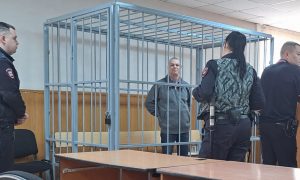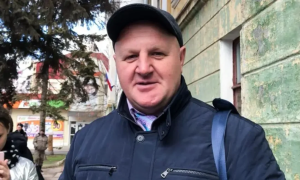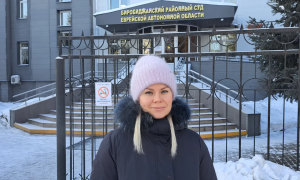Prosecutors are investigating at least 50 Jehovah’s Witnesses in 16 Russian regions on “extremism” criminal charges. Of these, 21 men and 1 woman are known to be in detention, with 3 more under house arrest and 27 under travel restrictions. If convicted, they could receive lengthy jail terms.

 More than 50 Jehovah’s Witnesses are now facing criminal prosecution for exercising their right to freedom of religion and belief. Law enforcement agencies carried out yet more armed raids, searches, and arrests in a further five Russian regions in June and early July, bringing to 22 the number of people now in detention. Another three are under house arrest and 27 under travel restrictions.
The most recent arrests include Anastasiya Polyakova in Omsk, the first woman known to have been placed in pre-trial detention (although several others had already been charged or named as suspects and put under travel restrictions) (see below).
(For a full list of those facing criminal prosecution, see forthcoming F18News article.)
For exercising their right to freedom of religion and belief, the Jehovah’s Witnesses stand accused of continuing the activities of their national-level Administrative Centre and the local communities which it oversaw. All of these were outlawed as “extremist” by Supreme Court rulings of 20 April and 17 July 2017 (see F18News 18 July 2017Â http://www.forum18.org/archive.php?article_id=2297).
International human rights law, however, allows anyone to exercise freedom of religion and belief without state permission.
Criminal investigations resulting from the 2017 ban are now underway in 16 regions – Republic of Bashkortostan, Belgorod, Ivanovo, Jewish Autonomous Region, Krasnoyarsk, Magadan, Murmansk, Omsk, Orenburg, Perm, Primorye, Pskov, Republic of Sakha-Yakutiya, Saratov, Republic of Tatarstan, and Tomsk.
The prosecutions come despite the judges’ insistence whey they issued the ruling that it “does not amount to prohibition of the religion of Jehovah’s Witnesses as such”, and that the Russian government has twice claimed that the ban “does not contain a restriction or prohibition on individual profession of [Jehovah’s Witness] teachings” (see F18News 23 April 2018Â http://www.forum18.org/archive.php?article_id=2372).
Muslims also targeted
Muslim readers of works by theologian Said Nursi are also targeted by “anti-extremism” raids, prosecutions and jailings. Typically, such Muslims meet in private homes to study Islam, with one or more expounding Nursi’s works. They also pray, eat, and drink tea together, and do not seek state permission to meet. Continuing a pattern of jailings re-started in 2017, in May 2018 Ilgar Aliyev was jailed for eight years, the longest known prison term for studying Nursi’s works (see F18News 2 July 2018Â http://www.forum18.org/archive.php?article_id=2391).
In June, Imam Komil Odilov was jailed for two years for the same “crime”. Six Muslim men are known to be currently in prison – or in custody with appeals pending – having been found guilty of involvement in meetings to read Nursi’s works (see F18News 8 June 2018 http://www.forum18.org/archive.php?article_id=2386).
Protests
On 21 June, the Presidential Council on Human Rights asked Russia’s General Prosecutor’s Office to examine the legality of the Supreme Court’s ban on Jehovah’s Witness organisations.
The wives of some of the men in pre-trial detention had written to the Council on 7 June, asking “how many more dozens, hundreds, thousands of prisoners of conscience are needed in order to end this unjust criminal prosecution of people for their faith in God?”and claiming that “Against a whole religion, one of the largest Christian denominations in Russia, a real terror has now been unleashed”.
More than 60 Russian human rights activists, lawyers, and journalists also published a statement on 19 June. “The persecution of Jehovah’s Witnesses shows the inconsistency of anti-extremist legislation in general,” they argued. “If society does not protect the Jehovah’s Witnesses, if their rights are not restored, this will mean that everyone can be declared an extremist.” Their statement ends by calling for the release of all detainees and the overturning of the Supreme Court’s ban.
Lengthy prison terms, bank accounts blocked
Investigators have opened criminal cases against these Jehovah’s Witnesses under Criminal Code Article 282.2 Part 1 (“Organisation of the activity of a social or religious association or other organisation in relation to which a court has adopted a decision legally in force on liquidation or ban on the activity in connection with the carrying out of extremist activity”) or Part 2 (“Participation in the activity of a social or religious association or other organisation in relation to which a court has adopted a decision legally in force on liquidation or ban on the activity in connection with the carrying out of extremist activity “), and in a few instances under Article 282.3 Part 1 (“Financing of extremist activity”). If convicted, they could receive lengthy prison sentences or heavy fines (see Forum 18’s Russia “extremism” religious freedom survey http://www.forum18.org/archive.php?article_id=2215). It is unknown when any of their cases will come to court.
The Jehovah’s Witnesses under investigation are also now starting to appear on the Federal Financial Monitoring Service (Rosfinmonitoring) “List of Terrorists and Extremists”, whose accounts banks are obliged to freeze (see Forum 18’s Russia “extremism” religious freedom survey http://www.forum18.org/archive.php?article_id=2215).
Gennady Shpakovsky from Pskov and Alam Aliyev from Birobidzhan were added to the List on 6 July, Anatoly Vilitkevich from Ufa on an unknown date, and Sergei Skrynnikov on 27 March.
Typically, law enforcement operatives from a variety of agencies, including armed men in masks and body armour, arrive at Jehovah’s Witnesses’ homes usually late at night or early in the morning. The occupants are sometimes made to lie on the floor or face the wall while the officers search their flats and houses. Officers then confiscate a similar range of possessions – electronic devices, bank cards, personal photographs, and books – and take the Jehovah’s Witnesses, including children and the elderly, to a police station or Investigative Committee office for questioning (see eg. F18News 6 June 2018 http://www.forum18.org/archive.php?article_id=2385).
Interrogations can last several hours, after which most people are released (some under travel restrictions). Others are kept in temporary detention until investigators decide whether to apply to a court for longer-term restrictive measures – they must do this within 48 hours of the initial detention (see eg. F18News 6 June 2018 http://www.forum18.org/archive.php?article_id=2385).
A judge must then decide whether to grant an investigator’s request to place an individual in detention or under house arrest. An initial period of detention/house arrest lasts for two months from the date the criminal case was opened (usually on or shortly before the date of the raid) – towards the end of this period, investigators must return to court if they wish to seek an extension. Detainees may appeal to a higher court to have these restrictive measures lifted or reduced (see eg. F18News 6 June 2018 http://www.forum18.org/archive.php?article_id=2385).
A new law signed by President Vladimir Putin on 3 July stipulates that one day in pre-trial detention now counts as one and half days in a correctional colony after sentencing (it will be applied retroactively). Previously, custodial sentences were reduced by exactly the length of time a person had served in pre-trial custody.
Conditions for the Jehovah’s Witnesses in detention are “more or less fine, no different from those of other detainees”, Jehovah’s Witness spokesman Yaroslav Sivulsky told Forum 18 on 10 July. They are allowed to have Bibles, he added, although only in the Synodal version. The Jehovah’s Witnesses New World version is banned as “extremist” (see F18News 29 September 2017Â http://www.forum18.org/archive.php?article_id=2319).
On the whole, the Jehovah’s Witness detainees have reported good relations with prison staff. According to Sivulsky, some guards have even asked “Why are you here? Have they really started jailing people for reading the Bible?”Â
Forum 18 wrote to the Investigative Committee’s federal-level press office before the start of the Moscow working day on 10 July, asking why the use of armed force is deemed necessary and whether Jehovah’s Witnesses are allowed religious literature in detention. No reply has been received as of the end of the Moscow working day on 11 July.Â
Two criminal trials already underway
Two Jehovah’s Witnesses are already on trial for alleged “extremism” offences which took place before the nationwide ban came into force (see F18News 27 April 2018Â http://www.forum18.org/archive.php?article_id=2373).
The registered Jehovah’s Witness organisation in Oryol was ruled “extremist” and ordered liquidated in June 2016 (see F18News 15 February 2017Â http://www.forum18.org/archive.php?article_id=2256). Dennis Ole Christensen’s prosecution is derived from this local ban, and not the nationwide prohibition on Jehovah’s Witness activities, which came into force in July 2017, after the case against him was initiated (see F18News 18 July 2017Â http://www.forum18.org/archive.php?article_id=2297).
Prosecutors accuse Christensen of “continuing the activities” of the banned and liquidated Oryol Jehovah’s Witness community, and have charged him under Criminal Code Article 282.2, Part 1 (“Organisation of the activity of a social or religious association or other organisation in relation to which a court has adopted a decision legally in force on liquidation or ban on the activity in connection with the carrying out of extremist activity”) (see F18News 20 February 2018Â http://www.forum18.org/archive.php?article_id=2355).
Christensen has appeared 23 times at Oryol’s Railway District Court, most recently on 9 July.
Arkadya Akopovich Akopyan has undergone 19 hearings (the latest on 3 July) at Prokhladny District Court in Kabardino-Balkariya. He is charged under Criminal Code Article 282, Part 1 (“Actions directed at the incitement of hatred [nenavist] or enmity [vrazhda], as well as the humiliation of an individual or group of persons on the basis of sex, race, nationality, language, origin, attitude to religion, or social group”) (see F18News 20 February 2018Â http://www.forum18.org/archive.php?article_id=2355).
Prosecutors accuse Akopyan of giving sermons which “degraded the dignity” of Orthodox and Muslim clergy, condoning Pussy Riot’s demonstration in Moscow’s Cathedral of Christ the Saviour in 2012, and giving banned “extremist” literature to his community.
The case against Akopyan is based on the testimony of five witnesses who are not members of the Jehovah’s Witnesses, but who claim to have attended meetings at which they heard the allegedly extremist sermons and were given banned texts to distribute. This is despite the fact that their mobile phone records show that they were nowhere near the Jehovah’s Witnesses’ building at the times in question, defence lawyers have claimed (see F18News 27 April 2018Â http://www.forum18.org/archive.php?article_id=2373).
Another man charged with alleged offences from before the Supreme Court ruling – Yury Zalipayev – will soon appear in court in Maysky, also in Kabardino-Balkariya (see below).
Omsk raid
The Omsk Region Investigative Committee carried out simultaneous raids on four homes on 4 July at 7am. They continued searching houses, gardens, outbuildings, and cars until 3pm that day, and confiscated all electronic devices and drives. Officers took away Anastasiya Andreyevna Polyakova (born 25 May 1984) and her husband Sergei Valeryevich Polyakov (born 28 April 1972), and had them put in pre-trial detention on 6 July by order of Azovo District Court. Their initial release date is unknown, but is likely to be no later than 4 September, Forum 18 notes.
The investigators left the Polyakovs’ front door broken in, the jw-russia.org news website commented on 6 July, and nobody was able to contact the couple for two days.
Anastasiya Polyakova is the first Jehovah’s Witness woman to be held in pre-trial detention. Investigators have now charged her and Sergei under Article 282.2 Part 2, the jw-russia.org news website added on 10 July.
Neither Anastasiya nor Sergei was among the founding members of Omsk’s former Jehovah’s Witness community, according to federal tax records.
Neither yet appears on the Rosfinmonitoring “List of Terrorists and Extremists”.
No criminal cases are known to have been opened against any other Jehovah’s Witnesses else in Omsk Region.
The Polyakovs’ prison address is: 644007 Omsk, ulitsa Ordzhonikidze 86, Investigation Prison No. 1
Krasnoyarsk airport arrest
FSB officers arrested Andrei Garafetanovich Stupnikov (born 17 September 1973) at 4.20am on 3 July as he and his wife were checking in for a flight at Krasnoyarsk airport.
The following day, 4 July, Judge Marina Belova of the city’s Railway District Court ordered Stupnikov to be placed in pre-trial detention until 2 September. According to the jw-org news website, investigators indicated at the hearing that Stupnikov had been planning to attend the Jehovah’s Witnesses’ international congress in Germany; the judge agreed that he “could claim political asylum [in Germany], knowing he was subject to criminal prosecution”, and therefore decided he should be kept in custody.
Investigators have opened a criminal case against Stupnikov under Article 282.2 Part 1, but he remains a suspect and has not yet been formally charged. No criminal case is known to have been opened against Stupnikov’s wife or any other Jehovah’s Witnesses in Krasnoyarsk Region.
Stupnikov’s name has not yet been added to the Rosfinmonitoring “List of Terrorists and Extremists”.
Forum 18 believes Stupnikov’s prison address to be: 660075, Krasnoyarsk, ulitsa Respubliky 72, Investigation Prison No. 1
Raids in Sakha-Yakutiya
On 30 June and 1 July, the Investigative Committee conducted raids on eight homes in the town of Lensk in the Republic of Sakha-Yakutiya. Officers took 22 people to a police station, of whom 15 were then interrogated.
Igor Nikolayevich Ivashin (born 16 April 1976) is so far the only person known to be the subject of a criminal case (under Article 282.2, Part unknown). He has been placed under travel restrictions, but it is unknown whether he has yet been charged. He does not yet appeal on the Rosfinmonitoring “List of Terrorists and Extremists”.
Before the nationwide ban on Jehovah’s Witness activity, Lensk did not have a registered Jehovah’s Witness congregation.
More raids in Ivanovo Region
Investigative Committee and police officers conducted another round of house searches in the town of Shuya on 26 June, the jw-russia.org news website reported on 10 July. The searches seized a large quantity of personal possessions, including cameras, musical scores, and bibles (even the Synodal edition used in the Russian Orthodox Church), as well as electronic devices commonly confiscated in such raids.
Several people were taken to Investigative Committee headquarters for questioning, including a ten-year-old child. Investigators allegedly threatened the girl’s mother that she would be charged with “involving a minor in the commission of a crime” if she did not cooperate with the investigation.
After the latest searches, officers placed another two people, Svetlana P. and Aleksei A., under travel restrictions, the European Association of Jehovah’s Witnesses told Forum 18 on 11 July. Aleksei A. has been charged under Article 282.2, Part 2. Svetlana P. is under investigation under Article 282.2, Part 1 and 282.3, Part 1, but it is unknown whether she has been charged or named as a suspect.
Shuya previously saw raids on Jehovah’s Witness homes on 20 April. Dmitry Vasilyevich Mikhailov (born 25 October 1977) was later taken into pre-trial custody on 29 May. He faces charges under Criminal Code Article 282.3, Part 1 (“Financing of extremist activity”), in addition to Criminal Code Article 282.2, Part 1 (“Organisation of the activity of a social or religious association or other organisation in relation to which a court has adopted a decision legally in force on liquidation or ban on the activity in connection with the carrying out of extremist activity”). Shuya City Court ruled that Mikhailov should be kept in custody until 29 July.
Mikhailov had previously been under travel restrictions after a law enforcement raid on his home on 20 April (see F18News 25 May 2018Â http://www.forum18.org/archive.php?article_id=2381).
His wife Yelena Valentinovna Mikhailova (born 9 August 1983) and Svetlana Yuryevna Shishina (born 16 November 1975) were placed under travel restrictions and have also been charged under Criminal Code Article 282.3, Part 1 (“Financing of extremist activity”), in addition to Criminal Code Article 282.2, Part 1 (“Participation in…”).
Saratov raids
Saratov Jehovah’s Witnesses Konstantin Viktorovich Bazhenov (born 10 May 1975), Feliks Khasanovich Makhammadiev (born 14 December 1984), and Aleksei Vladimirovich Budenchuk (born 27 July 1982) have all been charged under Article 282.2 Part 1 and placed in pre-trial detention until 12 August.
Investigators have also named Aleksei Petrovich Miretsky (born 14 December 1975), Roman Aleksandrovich Gridasov (born 16 September 1978), and Gennady Vasilyevich German (born 12 June 1969) as suspects (also under Article 282.2, Part 1) and placed them under travel restrictions.
The men were among more than ten people taken away for questioning after raids on seven homes in Saratov and the village of Shirokoye on 12 June, in which law enforcement agents broke down the doors of flats (in one case, they got the wrong address and broke in the door of a neighbour’s home). Officers seized all electronic devices, books, photographs, notebooks, money, bank savings books, and passports. Some of those taken to the FSB’s Saratov officers were interrogated until past midnight.
During two of the house searches, officers planted banned extremist literature, Jehovah’s Witnesses claim. At Aleksei Budenchuk’s house, for example, “in the sleeve of a child’s jacket on a hanger, [officers]…demonstratively ‘discovered’ two books, one of which was on the Federal List of Extremist Materials”, according to a 15 July report on the jw-russia.org news website.
Shirokoye had no registered Jehovah’s Witness congregation before the nationwide ban; it is unclear whether any of the men were founding members of the Saratov community.
None of the men yet appears on the Rosfinmonitoring “List of Terrorists and Extremists”.
Forum 18 believes Bazhenov, Makhammadiev, and Budenchuk are being held at: 410012 Saratov, ulitsa Kutyakova 105, Investigation Prison No. 1
Pskov raidsÂ
FSB personnel and armed National Guard troops carried out “no fewer than five raids” on Jehovah’s Witness homes in Pskov on 3 June, in some cases breaking down front doors, according to the jw-russia.org news website. The families searched included both very young children and elderly people, and at least three people were taken away for interrogation. As usual, officers seized tablet computers and mobile phones.
On 31 May, investigators opened a criminal case under Article 282.2, Part 1 against Gennady Valerianovich Shpakovsky (born 6 October 1958). He is now under travel restrictions and has not yet been formally charged.
No criminal case is known to have been opened against any other Jehovah’s Witnesses in Pskov Region.
According to federal tax records, Shpakovsky was formerly the chairman of the Pskov Jehovah’s Witness community. His name was added to the Rosfinmonitoring “List of Terrorists and Extremists” on 6 July 2018, according to “Rossiyskaya Gazeta”.
Confirmed detentions in Magadan
Konstantin Nikolayevich Petrov (born 9 August 1986), Yevgeny Anatolyevich Zyablov (born 9 March 1977), and Sergei Liviyevich Yerkin (born 23 June 1953) were all arrested after raids on their homes in Magadan on 30 May. On 1 June, Magadan City Court ordered that they be held in pre-trial custody until 29 July.
Law enforcement agents also arrested Magadan resident Ivan Grigoryevich Puyda (born 5 November 1978) in Khabarovsk on 30 May. Puyda had been in Khabarovsk on business, Jehovah’s Witnesses explained to Forum 18, and has therefore been returned to Magadan to be kept in custody there. On 1 June, Khabarovsk’s Railway District Court ordered his detention until 30 July.
None of the four men’s names has yet been added to the Rosfinmonitoring “List of Terrorists and Extremists”.
Forum 18 believes the men’s prison address to be: 685000 Magadan, Garazhny pereulok 6a, Investigation Prison No. 1
Release from detention in Bashkortostan
Anatoly Sergeyevich Vilitkevich, the first Jehovah’s Witness to be put in pre-trial detention after the nationwide ban came into force, has been released from custody and instead placed under house arrest.
Investigative Committee officers initially arrested Vilitkevich (born 15 September 1986) on 10 April in his hometown of Ufa, and charged him under Article 282.2 Part 1 (see F18News 23 April 2018Â http://www.forum18.org/archive.php?article_id=2372).
On 12 April, Lenin District Court ordered him held in pre-trial custody until 2 June – the term was extended on 1 June until 2 July. An initial appeal against Vilitkevich’s detention, on 19 April, was unsuccessful.
Vilitkevich’s lawyers argued at a second appeal at the Supreme Court of Bashkortostan that their client did not pose any threat to society. Judge Fait Karimov ordered that Vilitkevich should be placed under house arrest until 2 August.
Forum 18 has been unable to establish exactly what conditions of house arrest Vilitkevich is now under. According to the Criminal Procedural Code, in addition to not being permitted to leave one’s home, these usually include not being allowed to receive visitors, to send or receive post, to use the telephone, or to use the internet.
Vilitkevich’s name appears on the Rosfinmonitoring List of Terrorists and Extremists (it is unknown on what date it was added).
Another Jehovah’s Witness soon on trial in Kabardino-BalkariyaÂ
The criminal trial of Yury Viktorovich Zalipayev (born 8 October 1962) is due to begin on 16 July before Judge Yelena Kudryavtseva at Maysky District Court in Kabardino-Balkariya. A preliminary hearing was held on 4 July in closed court.
Prosecutors charged Zalipayev under Criminal Code Article 282, Part 1 (“Actions directed at the incitement of hatred [nenavist] or enmity [vrazhda], as well as the humiliation of an individual or group of persons on the basis of sex, race, nationality, language, origin, attitude to religion, or social group”) and Article 280, Part 1 (“Public calls for extremist activity”) for alleged offences which took place before the Supreme Court ruling on the liquidation of the Administrative Centre and nationwide ban on Jehovah’s Witness activities. He has been under travel restrictions since 24 April 2018.
Criminal Code Article 280, Part 1 carries the following possible punishments: a fine of 100,000 to 300,000 Roubles or one to two years’ salary; up to three years’ compulsory labour; up to four years’ imprisonment.
Criminal Code Article 282, Part 1 carries the following possible punishments: a fine of 300,000 to 500,000 Roubles or two to three years’ salary; one to four years’ compulsory labour with the loss of the right to hold certain jobs or engage in certain activities for up to three years; two to five years’ imprisonment (see Forum 18’s Russia “extremism” religious freedom survey http://www.forum18.org/archive.php?article_id=2215).Â
Zalipayev, the former chair of Maysky’s now-liquidated Jehovah’s Witness community, allegedly incited hatred towards Christian clergy, apparently by giving his parishioners copies of a banned magazine, one of whom later distributed it in public (see F18News 25 August 2017Â http://www.forum18.org/archive.php?article_id=2310).
Zalipayev’s name does not appear on the Rosfinmonitoring “List of Terrorists and Extremists” (see Forum 18’s Russia “extremism” religious freedom survey http://www.forum18.org/archive.php?article_id=2215). (END)





